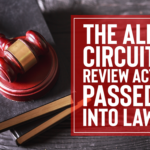Through a False Claims Act (FCA) claim, a plaintiff (or “relator” as they are called in FCA cases) stands to earn between 15-25% of the proceeds that are recovered in the lawsuit. Many FCA lawsuits result in damages in the tens of millions of dollars, meaning that a plaintiff can walk away with millions of dollars for their efforts in combating fraud perpetrated against the federal government and taxpayers.
An important aspect of any FCA claim is in bringing the FCA lawsuit to the attention of the Department of Justice (DOJ) who will evaluate the allegations and make a determination on whether or not to join in the lawsuit. Having the DOJ join the lawsuit is a tremendous help for several reasons. First of all, the DOJ’s participation is a sign that there is merit to the allegations. Perhaps more importantly, having the DOJ’s manpower and investigatory resources on a plaintiff’s side can go a long way towards proving the claim in court.
While DOJ participation is not necessary to win an FCA claim (and the whistleblower’s reward can actually go up to 30% of the proceeds when the DOJ does not join the case), understanding what the DOJ is looking for in an FCA claim is important to your ultimate success.
The Basics of an FCA Claim
To bring a successful FCA claim, it will be necessary for the plaintiff to show a preponderance of evidence (meaning it is more likely than not the case) that the defendant:
- knowingly presented to the federal government, or caused to be presented, a false or fraudulent claim for payment or approval;
- knowingly made, used, or caused to be made or used, a false record or statement material to a false or fraudulent claim; OR
- knowingly made, used, or caused to be made or used, a false record or statement material to an obligation to pay or transmit money or property to the federal government, or knowingly concealed or knowingly and improperly avoided or decreased an obligation to pay or transmit money or property to the federal government.
The Submitted Claim Must Be Knowingly and Materially False
As the above indicates, there is a general requirement of falseness that needs to be presented in an FCA claim to get the DOJ’s interest. Courts have further stated that, for a submitted claim to become the basis of a valid FCA claim, the claim must be “knowingly and materially false.”
“Knowing” refers to an intention on the part of the defendant of understanding the falseness of the claim presented. Thus, careless and unintentional mistakes on the part of a defendant may not be enough. Also, doing substandard work on a contract (e.g. mistakes and small errors in services provided) may not be enough. Materially false means the falsehood was important to the deal as a whole, thus an intentional falsehood which did not have a significant impact on the transaction might not carry enough weight either.
Instead, look for fraudulent activity such as charging for services and goods not provided, inflated invoices, providing goods that were different than what was invoiced, and so on.
The Information Should Be Original
Additionally, the information provided to the government in a FCA suit should be “original,” meaning information that was not already available to the government through its own resources or through other FCA claims that were previously brought by others. The whole point of the FCA whistleblower reward is to encourage those with information that the government needs to combat fraud to come forward.
Thus, if you wait too long to report information of fraud occurring, the DOJ may learn of the information elsewhere and not have an interest in joining your FCA lawsuit.
Work With a Whistleblower Attorney to Bring an FCA Claim
At Kreindler & Associates, our experienced government fraud attorneys will work with you every step of the way to determine your appropriate course of action, protect you from retaliation, and collect your much-deserved reward. If you suspect that someone is committing fraud against the U.S. government, contact us today for an evaluation of your allegations to determine whether you may be eligible for an FCA whistleblower award.



